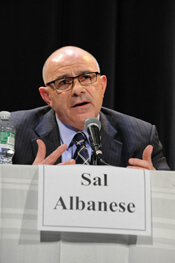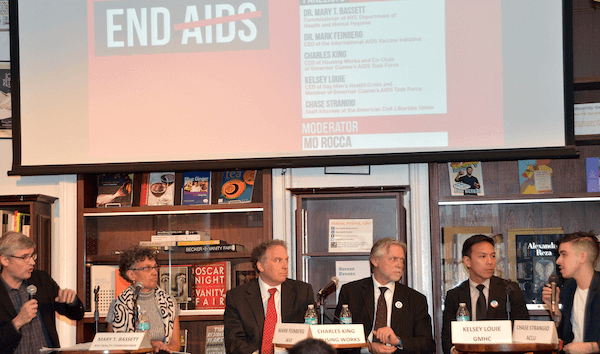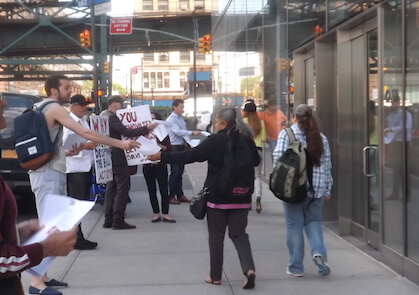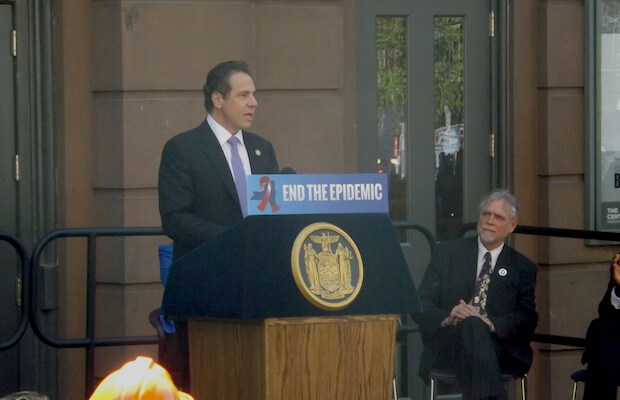Comptroller John Liu and City Council Speaker Christine Quinn at the March 20 mayoral forum. | DONNA ACETO
The conventional wisdom is that Christine Quinn has the queer vote sewn up in the Democratic primary for mayor, but the crowd of lesbian, gay, bisexual, and transgender voters at a March 20 debate let the City Council speaker know that they disapprove of some of her decisions.
“I think in the Bloomberg years a lot of us started to feel that the New York City we loved was being compromised,” said Bill de Blasio, the city’s public advocate, during a discussion of development policy in New York City.
“It’s been a long 12 years, it should have been eight,” he added in a jab at Quinn for orchestrating a 2008 City Council vote that altered the city’s term limits law from two four-year terms for officeholders to three. That drew loud and sustained applause from the audience.
With many supporters of the out lesbian Council speaker on hand, de Blasio, Thompson, Liu, Albanese find openings
Public Advocate Bill de Blasio. | DONNA ACETO
Quinn, an out lesbian who represents Chelsea and the West Village, and de Blasio were among five contenders for the Democratic nod who spent 90 minutes debating in the 1,000-seat Mason Hall at Baruch College on East 23rd Street.
The Quinn campaign had volunteers and campaign staff outside the auditorium more than an hour before the debate holding signs and offering Quinn stickers to attendees. Judging by those stickers, there were plenty of Quinn partisans in the audience. The line to enter stretched nearly the length of the block from Lexington Avenue to Third Avenue.
Despite the large crowd and the presence of some Quinn critics protesting outside, predictions on social media and elsewhere that organized protests would erupt inside did not materialize.
However the candidates felt about the evening, it was a triumph for the five LGBT Democratic political clubs that sponsored the event as they showed campaigns they could draw a large crowd of potential voters, volunteers, and donors.
Quinn also took a hit during a discussion of the paid sick leave bill that is pending before the City Council. That legislation would require businesses with four or more employees to give workers five paid sick days per year.
Former Comptroller Bill Thompson. | DONNA ACETO
John Liu, the city’s comptroller, de Blasio, Bill Thompson, the former comptroller, and Sal Albanese, who represented a Brooklyn City Council district from 1983 to 1998, all said they supported the bill and chastised Quinn for stalling it.
“I support the concept of paid sick leave, but not this bill in its current formation,” Quinn said. “It’s not a question for me of if, it’s a question of when.”
That comment was greeted with loud boos, but also applause. Quinn’s view is that the bill would add an additional financial burden on small businesses at a time when they are already suffering in a laggard economy. She said her office was weighing which measure to use –– for example, falling unemployment over some number of months –– to decide when to implement the benefit.
“Speaker Quinn, you need to stop blocking this bill right now,” Thompson said.
In a particularly biting comparison, Albanese recalled that the bill he supported that added sexual orientation to the city’s anti-discrimination law was kept off the floor for 15 years by Thomas Cuite, then the Council’s leader, before its 1986 enactment under his successor.
“That’s how the gay rights bill was bottled up for years and years,” Albanese said. “It should be debated and it should be voted on and members should not be terrified.”
The debate also showcased the wonkier side of three of the candidates. Quinn, de Blasio, and, to an extent, Thompson came armed with facts and knowledge of city law while Liu, who was 30 minutes late for the debate, and Albanese tended to give more general answers.
During a discussion of a proposed city law that would create an inspector general to oversee the police department –– something that four of the five candidates support –– Quinn said the Council would be doing all it could in that bill. Any such post would have to fall under mayor control, she said.
“You need to have a structure in law to monitor the police department,” she said. “This is the farthest we could go legally… By law, we cannot diminish the mayor’s powers.”
Former City Councilman Sal Albanese. | DONNA ACETO
There are inspectors general for most city agencies in the Department of Investigation (DOI).
In an apparent poke at Quinn, Albanese said the City Council could monitor the police, but was not doing that.
“I think the City Council has the power to do the job if they have the courage to do the job,” Albanese said. “If you think the DOI commissioner is independent of the mayor, I can sell you the Brooklyn Bridge… This is just cosmetics.”
The candidates also agreed on many issues. The Bloomberg administration has known since 2006 that new HIV infections are increasing among young, African-American gay men, and other data suggest that new HIV infections are increasing among white and Latino gay men. City Hall has consistently cut HIV prevention dollars.
The candidates agreed that funds for HIV prevention should be increased and they agreed that $12 million to fund programs for homeless youth, including queer youth, should be baselined, or made a permanent part of the city’s annual budget, and then increased incrementally each year.
“The city has a moral responsibility to make sure these kids are not out on the streets,” Albanese said.
“This is an issue that is so profoundly defining about who we are as a city,” said Quinn.
During a closing round of questions that required the candidates to answer yes or no, a rule that they tended to violate, Quinn and Albanese said that churches should be barred from holding worship services in city schools. De Blasio was the only candidate who promised to ban horse-drawn carriages and who supported the Bloomberg administration ban on the sale of large soft drink portions in restaurants.
All five agreed that the city had not done enough to address a meningitis outbreak among gay and bisexual men, that a state ban on surrogacy services contracts should be overturned, and that using condoms as evidence in criminal prosecutions should be barred. They also committed to pressing for a state cap on rents facing people living with AIDS that has been fought by the Bloomberg administration.
The debate was sponsored by the Gay & Lesbian Independent Democrats, the Jim Owles Liberal Democratic Club, the Lambda Independent Democrats of Brooklyn, the Lesbian & Gay Democratic Club of Queens, and the Stonewall Democrats of New York City. Gay City News was also a sponsor and the newspaper’s editor, Paul Schindler, moderated the debate.








































